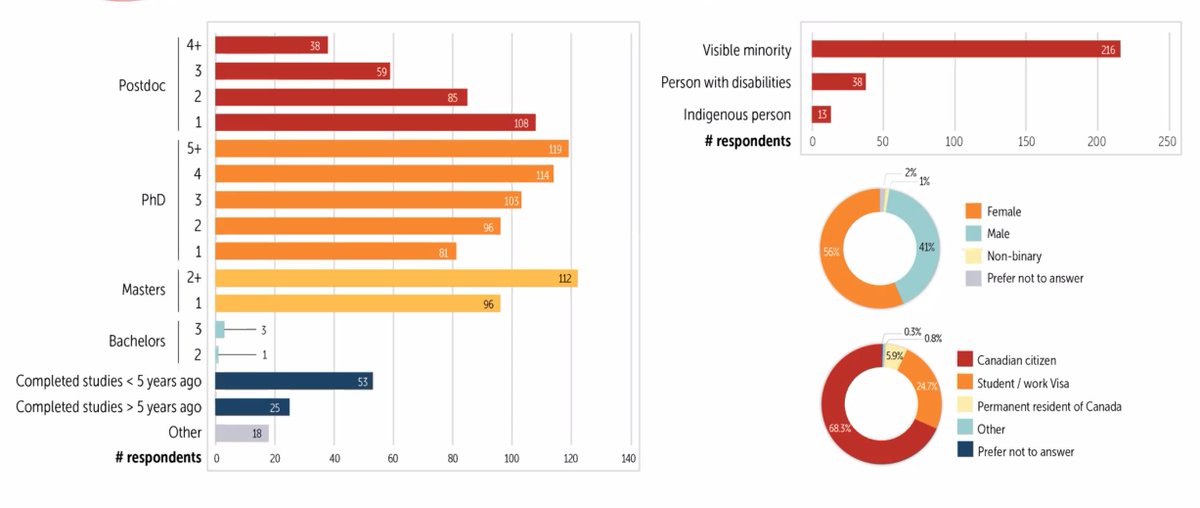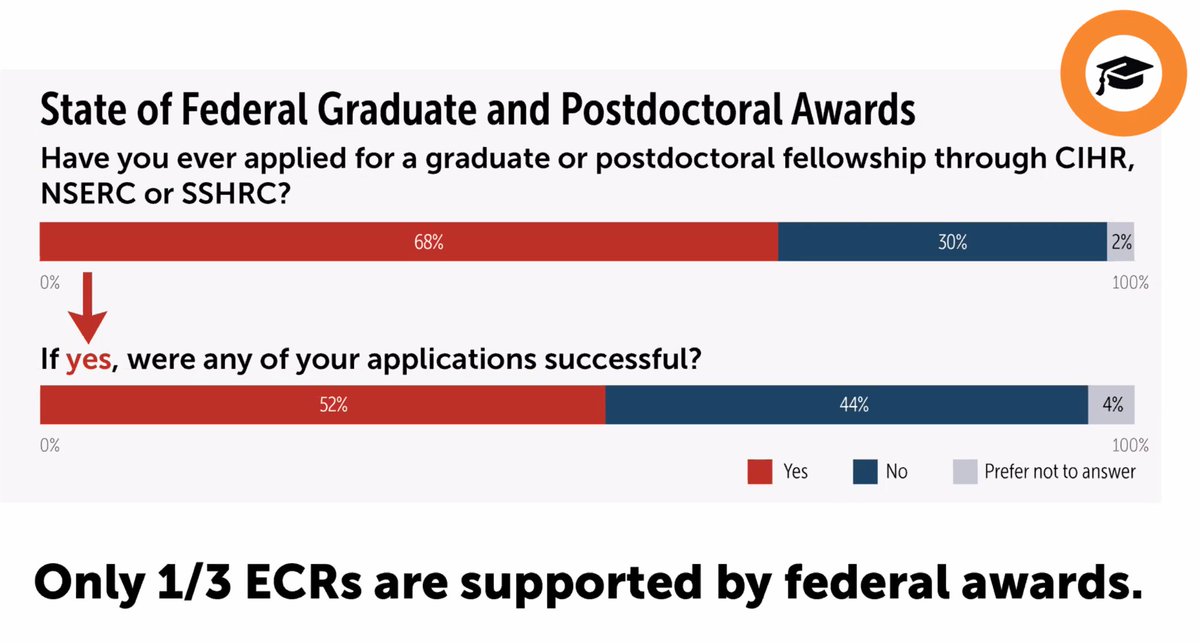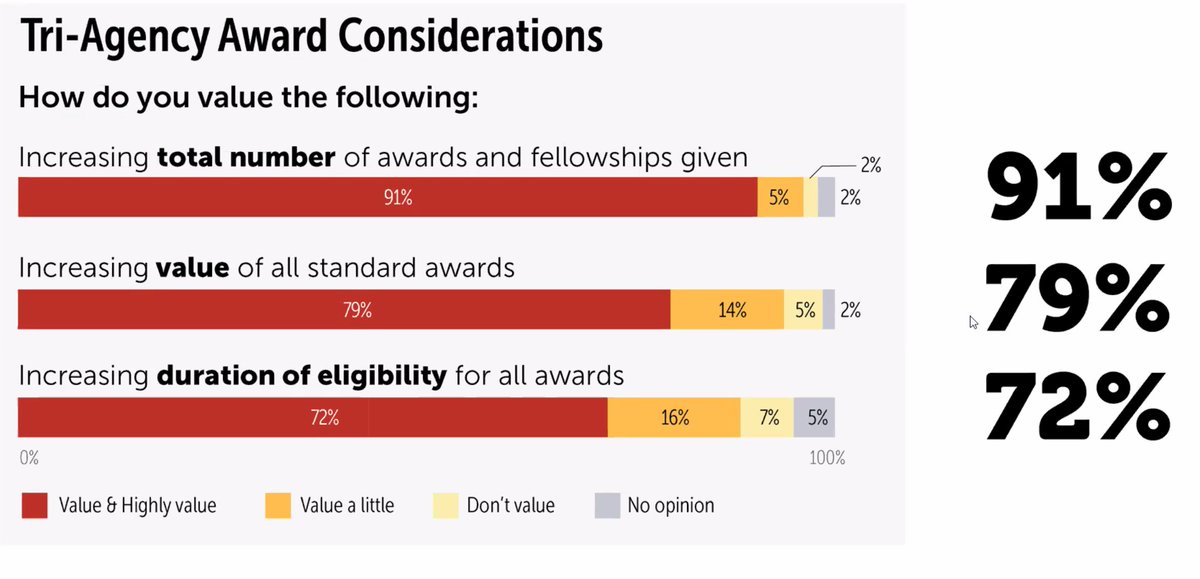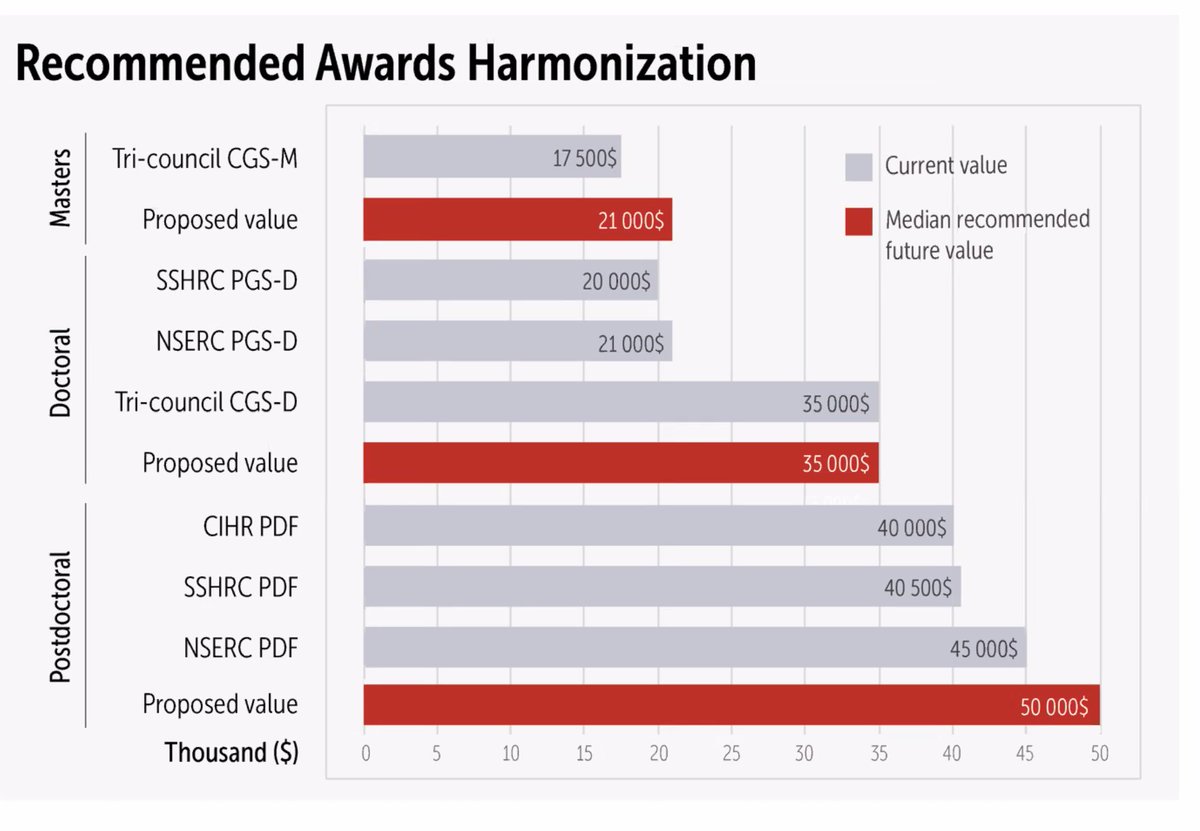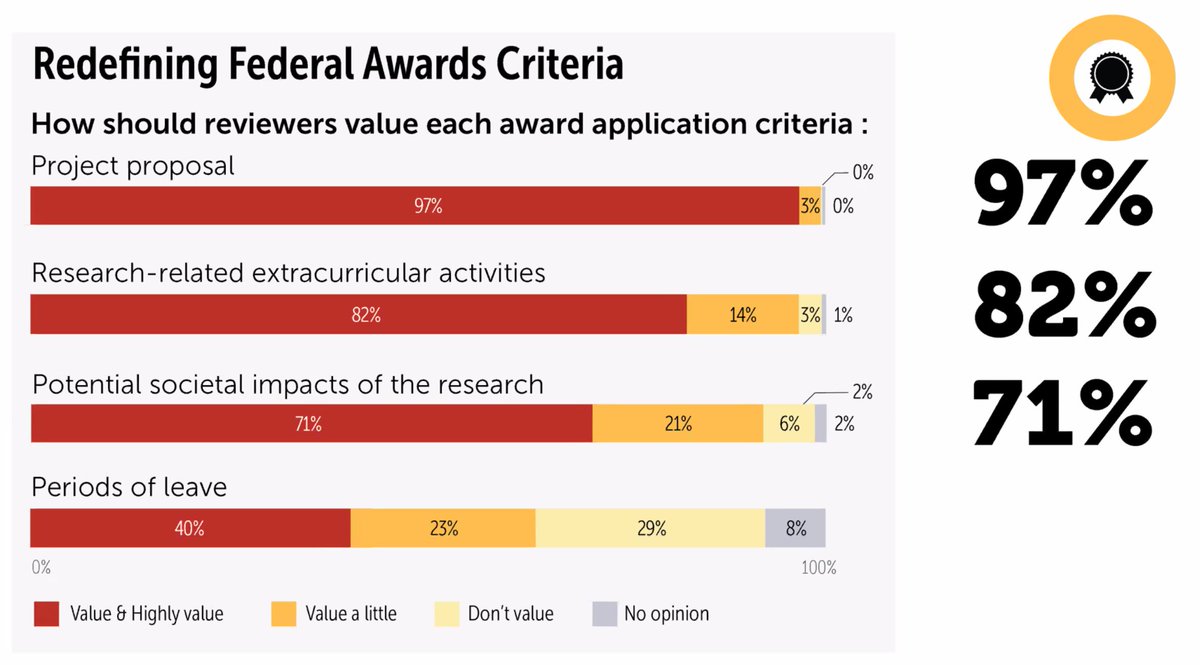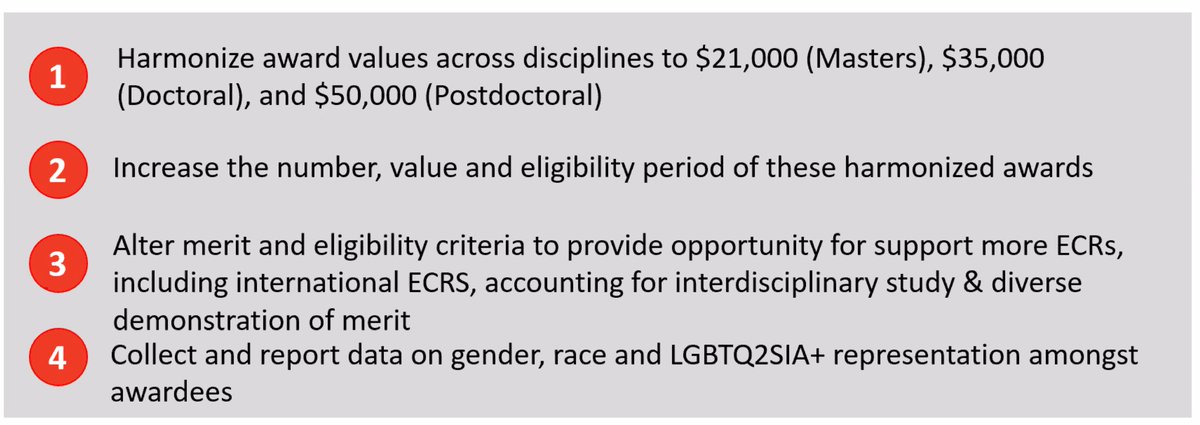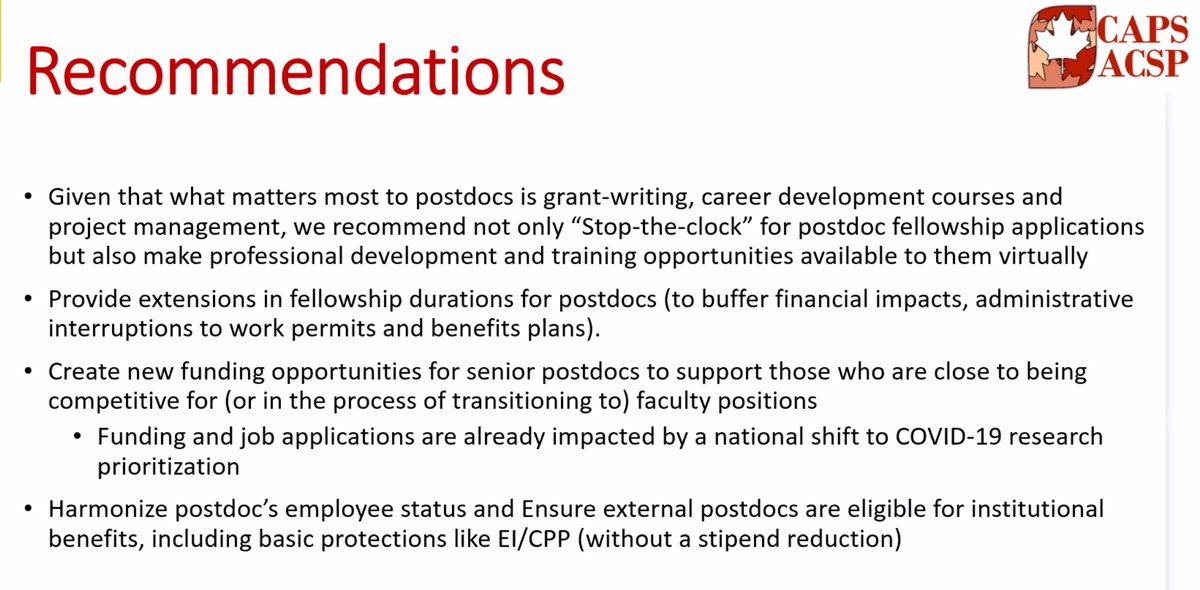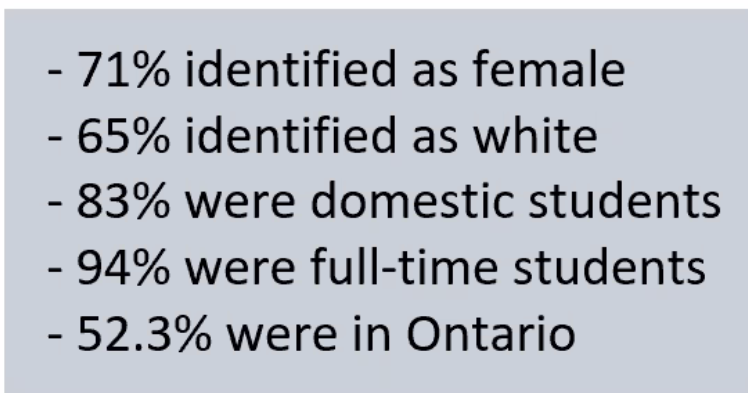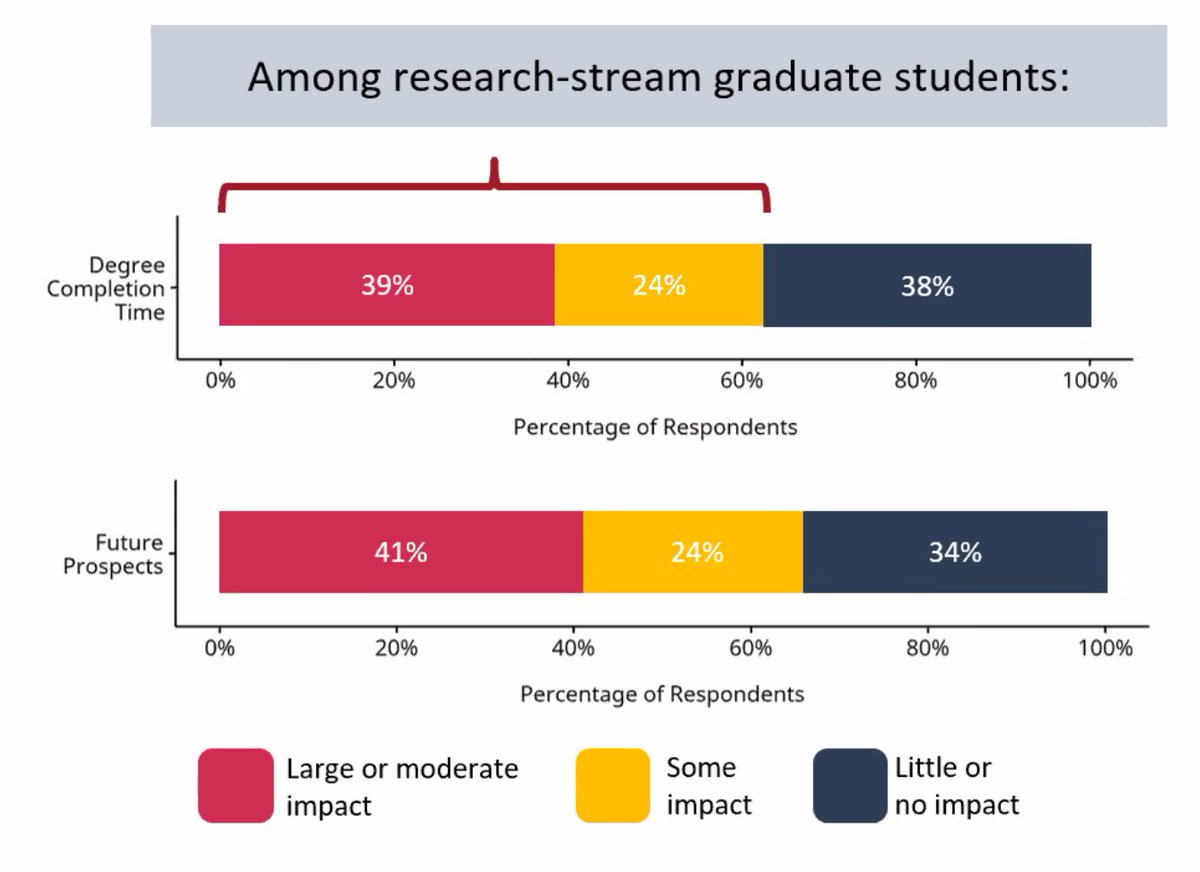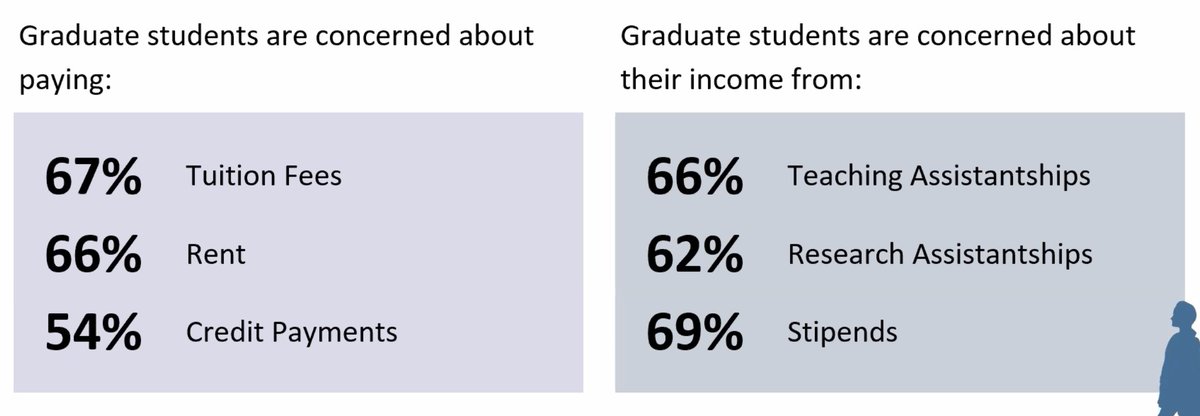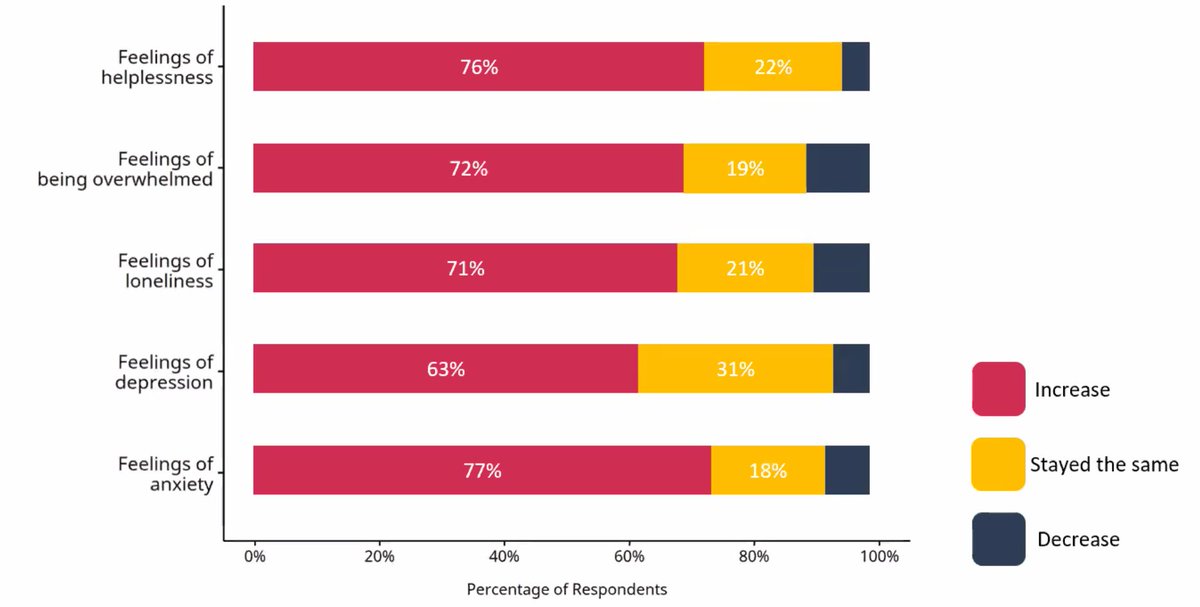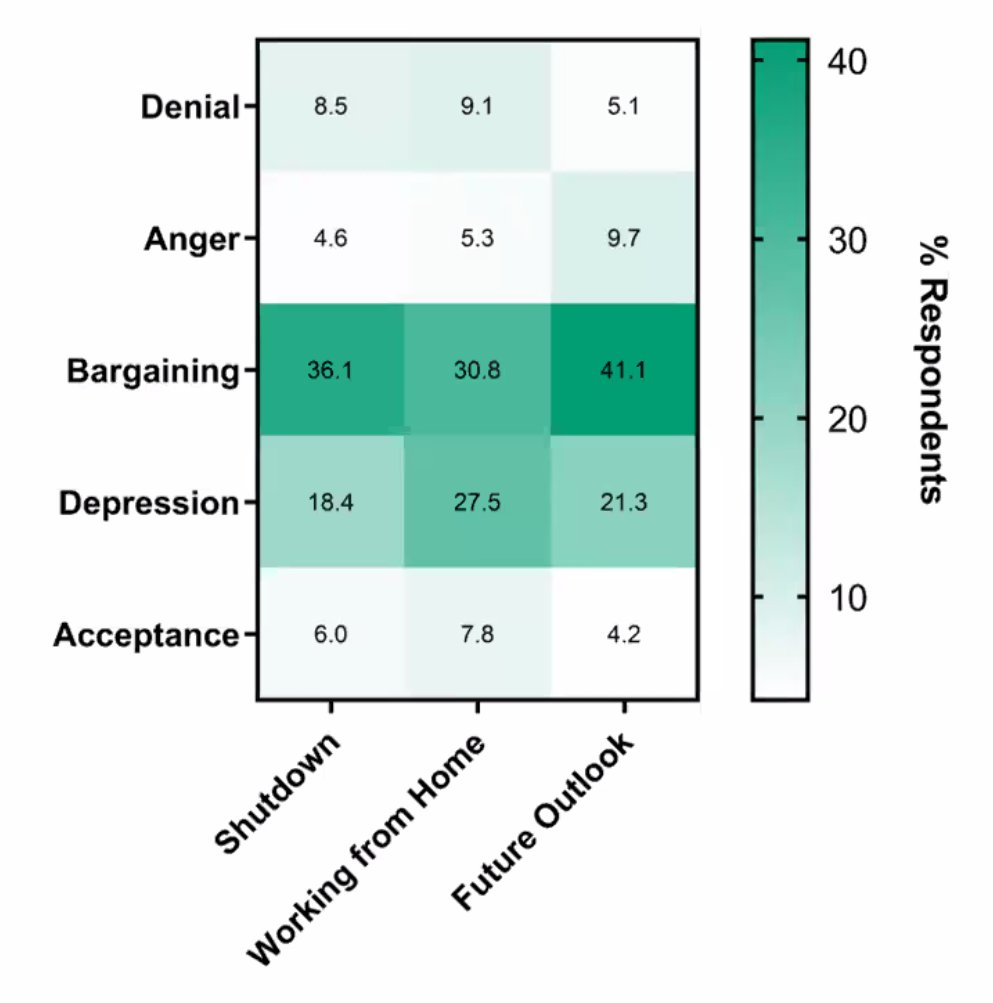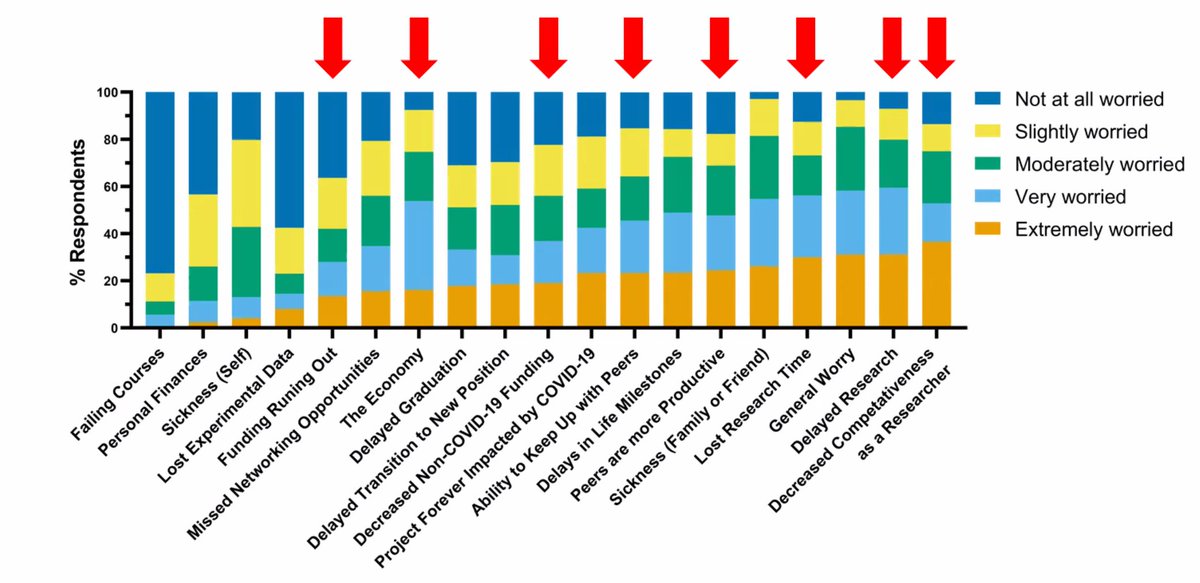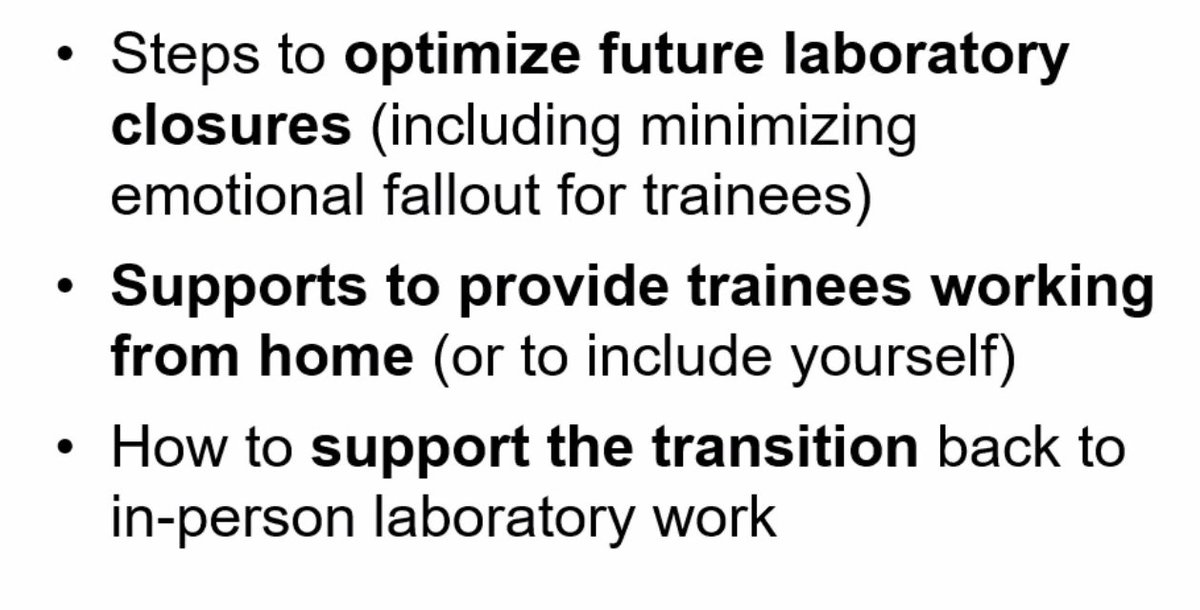 The Early Impact of COVID-19 on the #NextGen scientists @sciencepolicy #cspc2020
The Early Impact of COVID-19 on the #NextGen scientists @sciencepolicy #cspc2020ft @BovairdSamantha @this_is_farah @nabavinoushin @suartce, organized by @TOSciPolicyNet & moderated by Paul Dufour
Check out
 https://www.sp-exchange.ca/rethinking-federal-research-funding @DSP_SPE
https://www.sp-exchange.ca/rethinking-federal-research-funding @DSP_SPE  https://tspn.ca/covid19-report/ https://twitter.com/BovairdSamantha/status/1329127511989624832
https://tspn.ca/covid19-report/ https://twitter.com/BovairdSamantha/status/1329127511989624832
@BovairdSamantha's intro
 In 2018, @DSP_SPE launched a survey to assess students' perspective on federal funding
In 2018, @DSP_SPE launched a survey to assess students' perspective on federal funding
Survey focused on:
 Success Rates & award holder exp
Success Rates & award holder exp
 Application experience & criteria
Application experience & criteria
 International ECR challenges & support
International ECR challenges & support
 EDI consideration
EDI consideration
 In 2018, @DSP_SPE launched a survey to assess students' perspective on federal funding
In 2018, @DSP_SPE launched a survey to assess students' perspective on federal fundingSurvey focused on:
 Success Rates & award holder exp
Success Rates & award holder exp Application experience & criteria
Application experience & criteria International ECR challenges & support
International ECR challenges & support EDI consideration
EDI consideration
Survey Demographic
 SPE acknowledges that we should collect race-based data and include more gender identities in the future
SPE acknowledges that we should collect race-based data and include more gender identities in the future
 SPE acknowledges that we should collect race-based data and include more gender identities in the future
SPE acknowledges that we should collect race-based data and include more gender identities in the future
Recommended Scholarship value harmonization
Values should increase to recognize increased cost of living
Values should increase to recognize increased cost of living
Redefining success: add more value to
 Project proposal
Project proposal
 Research-related extracurricular activites
Research-related extracurricular activites
 Societal impact
Societal impact
 Periods of leave
Periods of leave
 Project proposal
Project proposal Research-related extracurricular activites
Research-related extracurricular activites Societal impact
Societal impact Periods of leave
Periods of leave
The survey also identified the need for better
 International student support
International student support
 Support for women and non-binary researchers
Support for women and non-binary researchers
*reminder that we did not provide sufficient gender identities in the survey at the time
 International student support
International student support Support for women and non-binary researchers
Support for women and non-binary researchers*reminder that we did not provide sufficient gender identities in the survey at the time
Final recommendations
 Harmonize value
Harmonize value
 Increase availability, value and eligibility period
Increase availability, value and eligibility period
 Merit and eligibility criteria
Merit and eligibility criteria
 Collect and report gender, race and LGBTQ2SIA+ rep data
Collect and report gender, race and LGBTQ2SIA+ rep data
 Harmonize value
Harmonize value Increase availability, value and eligibility period
Increase availability, value and eligibility period Merit and eligibility criteria
Merit and eligibility criteria Collect and report gender, race and LGBTQ2SIA+ rep data
Collect and report gender, race and LGBTQ2SIA+ rep data
@nabavinoushin's opening thoughts, representing @CAPSACSP
 Survey between Apr 1 to May 31
Survey between Apr 1 to May 31
 Most participants are in BC and AB, roughly 400 participants
Most participants are in BC and AB, roughly 400 participants
 Survey between Apr 1 to May 31
Survey between Apr 1 to May 31 Most participants are in BC and AB, roughly 400 participants
Most participants are in BC and AB, roughly 400 participants
 COVID19 impacted 23% work permit application. PR App on hold; Work permit extension delayed, contract extension unclear
COVID19 impacted 23% work permit application. PR App on hold; Work permit extension delayed, contract extension unclear 40% did not have sufficient financial insurance
40% did not have sufficient financial insurance 88% did not apply for EI
88% did not apply for EI 27%'s fellowships/contracts were negatively impacted
27%'s fellowships/contracts were negatively impacted
 17% of respondents had teaching responsibility; among them, 25% were negatively impacted by #COVID19
17% of respondents had teaching responsibility; among them, 25% were negatively impacted by #COVID19  83% had to cancel work-related travel plans
83% had to cancel work-related travel plans research for 75% of respond were affected by covid
research for 75% of respond were affected by covid 37% affected job application
37% affected job application
Positive experiences are attributed to
 employer being well organized in terms of virtual meetings and transitioning to remote work
employer being well organized in terms of virtual meetings and transitioning to remote work
 more time to read, analyze, write
more time to read, analyze, write
 employer allowed to take office equipment home
employer allowed to take office equipment home
 employer being well organized in terms of virtual meetings and transitioning to remote work
employer being well organized in terms of virtual meetings and transitioning to remote work more time to read, analyze, write
more time to read, analyze, write employer allowed to take office equipment home
employer allowed to take office equipment home
Final recommendations
Check out CAPS' website for more resources, and keep an eye out for the full report coming up
Check out CAPS' website for more resources, and keep an eye out for the full report coming up

@this_is_farah 's opening remarks for @TOSciPolicyNet
Here's the report again: https://tspn.ca/covid19-report/
 At the time, no survey to assess specifically concerns of grad students (as opposed to postsec students)
At the time, no survey to assess specifically concerns of grad students (as opposed to postsec students)
 Survey ran between Apr 22 to May 31
Survey ran between Apr 22 to May 31
 1431 respondants
1431 respondants
Here's the report again: https://tspn.ca/covid19-report/
 At the time, no survey to assess specifically concerns of grad students (as opposed to postsec students)
At the time, no survey to assess specifically concerns of grad students (as opposed to postsec students) Survey ran between Apr 22 to May 31
Survey ran between Apr 22 to May 31 1431 respondants
1431 respondants
Final thoughts & recommendations:
 Mitigate research long-term impact
Mitigate research long-term impact
 Increase funding
Increase funding
 Prioritize #EDI
Prioritize #EDI
 Invest in and improve mental health resources
Invest in and improve mental health resources
 Increase flexibility of long-term leave of absence
Increase flexibility of long-term leave of absence
@DSP_SPE 's report on Mental Health …https://95323b55-8978-495d-94dd-ed077c2bade4.filesusr.com/ugd/7fd26f_e0aed9a40d7b4294b4dcf078e7e3db40.pdf
 Mitigate research long-term impact
Mitigate research long-term impact Increase funding
Increase funding Prioritize #EDI
Prioritize #EDI Invest in and improve mental health resources
Invest in and improve mental health resources Increase flexibility of long-term leave of absence
Increase flexibility of long-term leave of absence@DSP_SPE 's report on Mental Health …https://95323b55-8978-495d-94dd-ed077c2bade4.filesusr.com/ugd/7fd26f_e0aed9a40d7b4294b4dcf078e7e3db40.pdf
@suartce 's opening remarks from
 Impact of COVID on lab-based research trainees
Impact of COVID on lab-based research trainees
 315 respondents + 18 semi-structured interviews
315 respondents + 18 semi-structured interviews
 Mixed method analysis
Mixed method analysis
 Kubler-Ross Model of grief
Kubler-Ross Model of grief
Manuscript available now; will post link when I find it later in thread
 Impact of COVID on lab-based research trainees
Impact of COVID on lab-based research trainees 315 respondents + 18 semi-structured interviews
315 respondents + 18 semi-structured interviews Mixed method analysis
Mixed method analysis Kubler-Ross Model of grief
Kubler-Ross Model of griefManuscript available now; will post link when I find it later in thread

Found the paper!
https://www.researchsquare.com/article/rs-59050/v1
 In addition to emotions (in the figure in the last post) also looked at other concerns
In addition to emotions (in the figure in the last post) also looked at other concerns
A few quotes highlighted
 decreased motivation to pursue/continue grad school
decreased motivation to pursue/continue grad school
 concerns of future funding for #science
concerns of future funding for #science
Final recommendations
https://www.researchsquare.com/article/rs-59050/v1
 In addition to emotions (in the figure in the last post) also looked at other concerns
In addition to emotions (in the figure in the last post) also looked at other concernsA few quotes highlighted
 decreased motivation to pursue/continue grad school
decreased motivation to pursue/continue grad school concerns of future funding for #science
concerns of future funding for #scienceFinal recommendations
Now for the panel discussion
Who should be responsible to implement recommendations above?
NN: All of us! Grads & postdocs to push for change, institutional support is necessary. Must work & engae w/ diff stakeholders
FQ: stakholders have diff responsibilities. Work together!

Who should be responsible to implement recommendations above?
NN: All of us! Grads & postdocs to push for change, institutional support is necessary. Must work & engae w/ diff stakeholders
FQ: stakholders have diff responsibilities. Work together!
CS: These findings aren't new; " #COVID19 exasperated cracks in the foundation". Long-lasting change requires academic cultural change
SB: small efforts have an impact: fill a survey, volunteer in grassroots groups. We are all NGOs - additional institutional support is crucial
SB: small efforts have an impact: fill a survey, volunteer in grassroots groups. We are all NGOs - additional institutional support is crucial
This affects *all* academic institutions around the world. How can we learn from the larger international academic community?
FQ: Check out survey from Australia (1000 respondents at U of Sydney). Found that many considered leaving academia echoing findings from @TOSciPolicyNet
FQ: Check out survey from Australia (1000 respondents at U of Sydney). Found that many considered leaving academia echoing findings from @TOSciPolicyNet
Article mentioned above:
https://www.nature.com/articles/d41586-020-02069-y
https://www.researchsquare.com/article/rs-36330/v2
NN: There's a relevant new article by @aaas (22k respondents worldwide) https://www.frontiersin.org/articles/10.3389/fpubh.2020.621563/full
https://www.nature.com/articles/d41586-020-02069-y
https://www.researchsquare.com/article/rs-36330/v2
NN: There's a relevant new article by @aaas (22k respondents worldwide) https://www.frontiersin.org/articles/10.3389/fpubh.2020.621563/full
SB: There is additional info from South America & China. Totally agree that we should be mindful of local experiences to draw a representative picture of the whole impact of covid on researchers
@MitacsCanada has been successful in broadening the perspectives of grad students to transition to the workforce. How can academic institutions adopt similar programs?
FQ: Unis must assess needs in their local student community.
FQ: Unis must assess needs in their local student community.
FQ: Federal funding agencies can better support "alternative career paths" like #scicomm. Rightfully pointed out though, the LARGE majority of grads don't continue in academia so is it really "alternative"

SB: @DSP_SPE 's precisely calls to broaden the metrics for excellence; should de-silo expectation of grads to pursue academic career paths; specific support for international students is further required which has been prev highlighted by @IWS_Network https://twitter.com/AnhKhoiTrinh/status/1327304650907914241?s=20
Paul Dufour adds that provincial funding agencies should also be included in the mix
What are your final advices?
CS: Ask PIs (or their students) how they responded to #COVID19 ; really telling about the research culture of their labs

What are your final advices?
CS: Ask PIs (or their students) how they responded to #COVID19 ; really telling about the research culture of their labs
NN: #scientists role is more than collecting data, we should use it to create an impact in our local environment. Highlights funding programs like the AAAS fellowship
FQ: For MITACS, open it up for Master students
FQ: For MITACS, open it up for Master students
FQ: For more senior students, you have an important role to mentor & aid upcoming students (applying for grad school, summer research internships, etc.).
https://canadasrop.ca/
PD's thoughts: "don't be discourage" by our current lived-reality!
https://canadasrop.ca/
PD's thoughts: "don't be discourage" by our current lived-reality!

 Read on Twitter
Read on Twitter